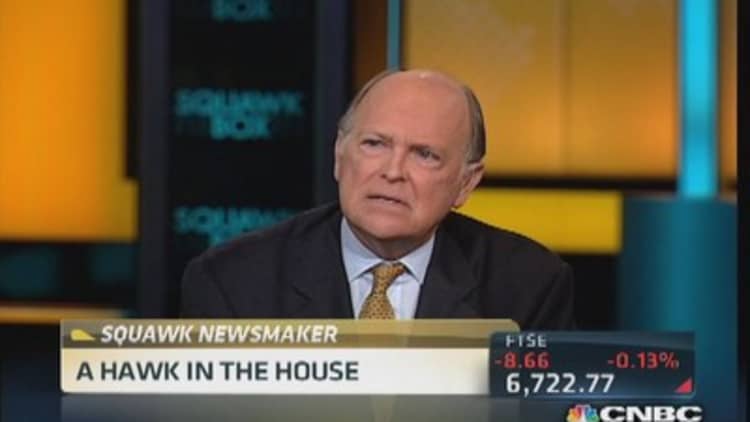
The Federal Reserve "clearly missed" a chance to begin tapering its massive bond-buying program in September, Philadelphia Fed President Charles Plosser told CNBC on Friday.
Wall Street had widely expected the Fed to scale back its $85-billion-a-month asset purchase program known as quantitative easing (QE) in September, but held off—citing the uncertainty surrounding joblessness and the Washington fight over funding the government and increasing the debt ceiling.
"I thought we missed an opportunity to make a small gesture to begin signaling that in fact this is a dial we can move and we can adjust it and fine tune it," he said in a "Squawk Box" interview. "The economy outlook hadn't changed that much since June."
No action was taken at the central bank's two-day October meeting that ended Wednesday. Many economists now believe that tapering is off the table for the rest of this year, with March 2014 emerging as a new target for scaling-back asset purchases.
By not starting to taper, Plosser said it "signals that thinking of QE3 as some kind of thing we can move around with some precision is a very difficult thing to do." The Philadelphia Fed president is not a voting member at the Fed this year, but will be come January.
(Watch more: McCain threatens to block Yellen nomination)
Plosser, a monetary hawk, said he was not a fan of QE2 and beyond. He believes it has not been particularly effective, and he warns that it's unknown what the long-term effects of the bond-buying will be.
He said the Fed hasn't been very clear on the idea of data dependency, but instead should put specific dollar limits on the size of the central bank balance sheet, which is approaching $4 trillion.
(Read more: This may be a scary sign for the market)
The Fed needs to consider how to get out of QE in a sensible way, Plosser said, adding he's beginning to worry about the consequences of unwinding. "I don't like to think about monetary policy in terms of the stock market," he said, but acknowledged that getting out of QE could create volatility down the road. He said the current round of QE—which some have nicknamed QE-infinity—will end at some point, though he won't give a timetable.
The Fed hasn't seen a satisfactory breakout in economic growth, and the inability to craft long term fiscal policy is hurting the economy, he said, cautioning that allowing inaction in Congress to drive monetary policy would not be good.
(Read more: Weak jobs recovery slams couples two ways)
The next round of budget talks are underway with deadlines early next year. The 16-day government shutdown ended in mid-October with temporary deals to supply funding until Jan. 15 and extend the borrowing limit until Feb. 7.
Plosser's outlook for the economy next year: Growth of 2 percent to 3 percent.
He also called Fed Vice Chair Janet Yellen—President Barack Obama's choice to succeed Ben Bernanke as central bank chair—capable and intelligent. If she's confirmed, Plosser said, the course of monetary policy that she helped steer at the Fed won't change.
—By CNBC's Matthew J. Belvedere. Follow him on Twitter @Matt_SquawkCNBC.


